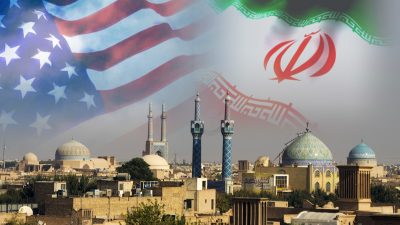The US Persistently Seeks to Destabilize Iran. Why is Washington So Deeply Concerned about Tehran’s Regional Influence in the Middle East?

Thirty eight years ago, in 1979, a revolution against a client regime installed and propped up by the United States succeeded in Iran. This was followed by the establishment of an independent state, the Islamic Republic of Iran. Ever since, the US’s presence, plans and attempts to maintain, deepen and expand its dominance throughout the Middle East has been seriously challenged and thwarted.
Hence, the US has persistently sought to make up for this loss and to this end, has supported individuals, tendencies and terrorist groups to bring down the revolutionary establishment in Iran and returning the old order of neo-colonial dependence. The hallmark of these attempts has been its support of the infamous Iraqi dictator, Saddam Hussein, in his aggressive war (1980-1988) against the newly founded Islamic Republic in Iran and its active involvement in Saddam’s many war crimes, including the widespread use of chemical weapons against Iranian troops and civilians. However, in spite of the huge number of dead and injured, the extensive infrastructural destruction and social detriments, this war failed to derail the revolutionary objective of independence from foreign control.
Faced with the repeated and very costly failures of its military plans, the US found it more feasible to invest more heavily on political approaches vis-a-vis Iran. Therefore, political plans had to be devised and/or cultivated to crush the strong waves of liberation from foreign domination and the struggle for independence in Iran. These plans had to also look beyond Iran; to the larger Middle East, which had been awakened and moved to action by the resistance struggle in Iran, particularly in Palestine which had suffered for decades under criminal Israeli occupation, and in Lebanon, devastated by its colonial past, Israeli aggression and foreign interventions.
Therefore, as early as the mid-1980s, the US and its allies, determined to impose crushing international sanctions on Iran, accused Iran of threatening international peace through its support for Palestinian and Lebanese freedom fighters – labeled as ‘terrorists’-, its alleged interference in the internal affairs of regional states closely dependent on the US, and Iran’s missile and civilian nuclear programs.
To this end, through fabrications, extensive lobbying and use of pressure in the international scene, the US succeeded in pushing through United Nations Security Council resolutions which placed Iran under international sanctions (2006) for its peaceful nuclear activities.
The UNSC sanctions were followed by the illegal US/EU comprehensive sanctions in 2011 targeting Iran’s financial system, shipping and energy industry. Sanctions dealt a heavy blow to the nation’s petroleum dependent economy but also had unintended positive consequences, in that, Iran’s chronic and deep-rooted dependence on its petroleum sales changed in favour of a more diversified economy and Iran’s flourishing nuclear activity made a huge leap forward, in both qualitative and quantitative terms.
However, after more than a decade of diplomatic interactions with world powers, which became significantly more meaningful towards the end of this period with Zarif as Foreign Minister, Iran’s right to nuclear enrichment and its pursuit of other peaceful nuclear activities was recognised. This important recognition came through after two years (2013-2015) of extremely tight negotiations between the P5+1 and Iran.
This achievement was set in the context of a multilateral agreement, namely, the Joint Comprehensive Plan of Action (JCPOA). The achievement was hard won due to the forces bluntly opposed to the multilateral negotiations. These most notably included neo-con members of the US Congress, Israel and Saudi Arabia.
The change in the US administration, and especially with the person of Trump in office, who saw the JCPOA as the “worst deal ever” provided the US neo-cons, Israel and Saudi Arabia with an extraordinary opportunity. Now, there was the unprecedented possibility to significantly increase the pressure on Iran, particularly through reinstating, and strengthening the old sanctions and devising new ones.
Therefore, they tried extremely hard to pressure the P5+1, the European Union side in particular, into accusing Iran of being in violation of the nuclear agreement. They tried equally hard to force a renegotiation of the nuclear agreement.
Having failed on both counts to reinstate international sanctions on Iran and to terminate the JCPOA, the Trump administration is now working desperately to pressure the big powers and the EU in particular, regarding the need to limit and to stop Iran’s formidable, though proven defensive, conventional missile program and Iran’s outstanding and growing regional influence.
Iran’s civilian nuclear activity is fundamentally very important to the country’s technological and industrial development. In contrast, the missile defense capability is of strategic importance to Iran’s defense and essential defence and security needs, with highly positive implications for the preservation of regional and international peace and security.
Iran’s civilian nuclear activity and its missile defense capability are both strategically very important to the country’s technological and industrial development on the one hand, and its essential needs for national defence and security, on the other.
These capabilities, however, are basically of a hard nature which many countries possess in various degrees. In contrast, regional influence is in essence a soft national capability, one which cannot be taken away, transferred or bought overnight. In this respect, it is potentially a most important national capability, deeply rooted in the beliefs, culture and history of a nation and a region.
With this in mind and in the context of the on-going political developments in the Middle East, it is necessary to examine why the US is so deeply concerned about Iran’s regional influence? I will next examine what in the US’s view is threatened by Iran’s regional influence. (To be continued)
The original source of this article is Global Research
Copyright © Farhad Shahabi, Global Research, 2017




Geen opmerkingen:
Een reactie posten